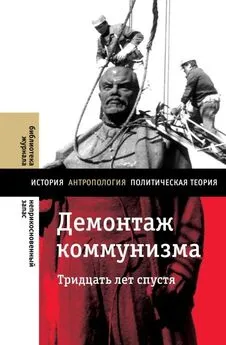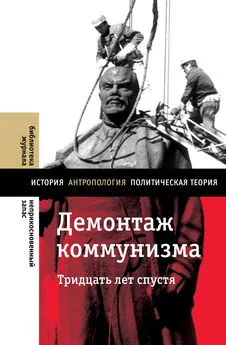Евгений Гонтмахер - Демонтаж коммунизма. Тридцать лет спустя
- Название:Демонтаж коммунизма. Тридцать лет спустя
- Автор:
- Жанр:
- Издательство:Литагент НЛО
- Год:2021
- Город:Москва
- ISBN:9785444814758
- Рейтинг:
- Избранное:Добавить в избранное
-
Отзывы:
-
Ваша оценка:
Евгений Гонтмахер - Демонтаж коммунизма. Тридцать лет спустя краткое содержание
Демонтаж коммунизма. Тридцать лет спустя - читать онлайн бесплатно ознакомительный отрывок
Интервал:
Закладка:
124
Frye T. Russian Studies is Thriving, Not Dying // The National Interest. 2017. October 3; http://nationalinterest.org/feature/russian-studies-thriving-not-dying-22547 (доступ 29 января 2021).
125
Лозунг «Знай своего врага» – один из основных стимулов развития советологии в период холодной войны ( Engerman D. C. Know Your Enemy: The Rise and Fall of America’s Soviet Experts. Oxford: Oxford University Press, 2009) – не утратил актуальности и сегодня.
126
Hale H. E. Patronal Politics; Way L. A. Pluralism by Default.
127
Davenport C. Multi-Dimensional Threat Perception and State Repressions: An Inquiry into Why States Apply Negative Sanctions // American Journal of Political Science. 1995. Vol. 38 (3). P. 683–713.
128
Levitsky S., Way L. A. Competitive Authoritarianism; Way L. A. Pluralism by Default.
129
Hale H. E. Patronal Politics.
130
Silitski V. Preempting Democracy: The Case of Belarus // Journal of Democracy. 2005. Vol. 16 (4). P. 83–97.
131
Way L. A. Pluralism by Default; Gel’ man V. The Politics of Fear. P. 27–45.
132
Reuter O. J. The Origins of Dominant Parties: Building Authoritarian Institutions in Post-Soviet Russia. Cambridge: Cambridge University Press, 2017.
133
Gel’ man V., Ryzhenkov S. Local Regimes, Sub-National Governance, and the «Power Vertical» in Contemporary Russia // Europe-Asia Studies. 2011. Vol. 63 (3). P. 449–465.
134
Reuter O. J., Robertson G. B. Subnational Appointments in Authoritarian Regimes: Evidence from Russian Gubernatorial Appointments // Journal of Politics. 2012. Vol. 74 (4). P. 1023–1037.
135
Frye T., Reuter O. J., Szakonyi D. Political Machines at Work: Voter Mobilization and Electoral Subversion in the Workplace // World Politics. 2014. Vol. 66 (2). P. 195–228.
136
Gel’ man V. Authoritarian Russia.
137
Kudelia S. The House that Yanukovych Built // Journal of Democracy. 2014. Vol. 25 (3). P. 19–34.
138
Fisun O. The Future of Ukraine’s Neopatrimonial Democracy // PONARS Policy Memos. 2015. № 394; http://www.ponarseurasia.org/memo/future-ukraine-neopatrimonial-democracy (доступ 29 января 2021).
139
Bueno de Mesquita B., Smith A. The Dictator’s Handbook.
140
Hedlund S. Russian Path Dependence. London: Routledge, 2005.
141
Kotkin S., Beissinger M. R. The Historical Legacies of Communism: An Empirical Agenda // Historical Legacies of Communism in Russia and Eastern Europe / M. R. Beissinger, S. Kotkin (eds). Cambridge: Cambridge University Press, 2014. P. 7.
142
Ibid. P. 16.
143
Gaddy C. G. Room for Error: The Economic Legacy of Soviet Spatial Misallocation // Historical Legacies of Communism in Russia and Eastern Europe. P. 52–67.
144
Gel’ man V. Political Foundations of Bad Governance in Post-Soviet Eurasia: Toward a Research Agenda // East European Politics. 2017. Vol. 33. № 4. P. 496–516.
145
Huskey E. Legacies and Departures in the Russian State Executive // Historical Legacies of Communism in Russia and Eastern Europe. P. 111–127.
146
Taylor B. From Police State to Police State? Legacies and Law Enforcement in Russia // Historical Legacies of Communism in Russia and Eastern Europe. P. 128–151.
147
Denzau A., North D. C. Sharing Mental Models: Ideologies and Institutions // Kyklos. 1994. Vol. 47 (1). P. 3–31.
148
Gel’ man V. Political Foundations of Bad Governance in Post-Soviet Eurasia.
149
Gel’ man V. Political Foundations of Bad Governance in Post-Soviet Eurasia.
150
Way L. A. Pluralism by Default.
151
Рогов К. Крымский синдром: механизмы авторитарной мобилизации // Контрапункт. 2015. № 1; https://www.ponarseurasia.org/sites/default/files/rogov_countepoint1_0_0.pdf (доступ 29 января 2021).
152
Gorenburg D. P. Minority Ethnic Mobilization in the Russian Federation. Cambridge: Cambridge University Press, 2003.
153
Goode J. P. The Decline of Regionalism in Putin’s Russia: Boundary Issues. Abingdon: Routledge, 2011.
154
Smyth R., Soboleva I. Looking beyond the Economy: Pussy Riot and the Kremlin’s Voting Coalition // Post-Soviet Affairs. 2014. Vol. 30 (4). P. 257–275; Robinson N. Russian Neopatrimonialism and Putin’s «Cultural Turn» // Europe-Asia Studies. 2017. Vol. 69 (2). P. 348–366.
155
Way L. A. Pluralism by Default.
156
См.: Brownlee J. Hereditary Succession in Modern Autocracies // World Politics. 2007. Vol. 59 (4). P. 595–628. Острое осознание постсоветскими элитами подобных перспектив создает у них мощные стимулы вести себя как «кочевые бандиты» ( Olson M. Dictatorship, Democracy, and Development. P. 567–576.) и чрезвычайно способствует различным проявлениям «недостойного правления» ( Cooley A., Heathershaw J. Dictators without Borders; Gel’ man V. Political Foundations of Bad Governance in Post-Soviet Eurasia).
157
Hale H. E. Patronal Politics.
158
Soldatov A., Borogan I. The Red Web: The Struggle between Russia’s Digital Dictators and the New Online Revolutionaries. New York: Public Affairs, 2015.
159
Gel’ man V. The Politics of Fear.
160
Robinson N. Russian Neopatrimonialism and Putin’s «Cultural Turn».
161
Davenport C. Multi-Dimensional Threat Perception and State Repressions.
162
Geddes B., Wright J., Franz E. Authoritarian Breakdowns and Regime Transitions: A New Data Set // Perspectives on Politics. 2014. Vol. 12 (2). P. 313–331.
163
Gel’ man V. Authoritarian Russia.
164
Идейные факторы играют в постсоветской политике сравнительно незначительную роль ( Hanson S. Post-Imperial Democracies: Ideology and Party Formation in Third Republic France, Weimar Germany, and Post-Soviet Russia. Cambridge: Cambridge University Press, 2010; Hale H. E. Patronal Politics) – вероятнее всего, вследствие политических уроков, извлеченных из неудач Горбачева, который искренне верил в возможность обновления социализма.
165
Beyond the Euromaidan: Comparative Perspective of Advancing Reform in Ukraine / H. E. Hale, R. W. Orttung (eds). Stanford: Stanford University Press, 2016.
166
Bunce V., Wolchik S. Defeating Authoritarian Leaders in Postcommunist Countries. Cambridge: Cambridge University Press, 2011.
167
Way L. A. Pluralism by Default.
168
Przeworski A. Democracy and the Market. Р. 10.
169
Gel’ man V. Authoritarian Russia; Golosov G. V. Authoritarian Learning in the Development of Russia’s Electoral System // Russian Politics. 2017. Vol. 2 (2). P. 182–205.
170
Hale H. E. Patronal Politics.
171
Abrams N., Fish M. S. Policies First, Institutions Second: Lessons from Estonia’s Economic Reforms // Post-Soviet Affairs. 2015. Vol. 31 (6). P. 491–513.
172
Magyar B. Post-Communist Mafia State: The Case of Hungary. Budapest: Central European University Press, 2016.
173
Dawisha K. Putin’s Kleptocracy: Who Owns Russia? New York: Simon and Schuster, 2014; Hill F., Gaddy C. G. Mr. Putin: Operative in the Kremlin. Washington, DC: Brookings Institution Press, 2015.
174
Hall S. G. F., Ambrosio T. Authoritarian Learning: A Conceptual Overview // East European Politics. 2017. Vol. 33 (2). P. 143–161; Golosov G. V. Authoritarian Learning in the Development of Russia’s Electoral System.
175
Bueno de Mesquita B., Smith A. The Dictator’s Handbook.
176
Kudelia S. The House that Yanukovych Built.
177
Svolik M. The Politics of Authoritarian Rule. Cambridge: Cambridge University Press, 2012.
178
Silitski V. Preempting Democracy: The Case of Belarus // Journal of Democracy. 2015. Vol. 16 (4). P. 83–97; Gel’ man V. The Politics of Fear.
179
Frye T., Gehlbach S., Marquardt K. L., Reuter O. J. Is Putin’s Popularity Real? // Post-Soviet Affairs. 2017. Vol. 33 (1). P. 1–15.
180
Gel’ man V. Political Foundations of Bad Governance in Post-Soviet Eurasia.
181
Munck G. L., Snyder R. Passion, Craft, and Method in Comparative Politics. Baltimore: Johns Hopkins University Press, 2007. Р. 324.
182
См., например: Gaidar Y. Collapse of an empire: Lessons for modern Russia. Brookings Institution Press, 2010; Åslund A. How Capitalism Was Built: The Transformation of Central and Eastern Europe, Russia, the Caucasus, and Central Asia. 2nd edition. New York: Cambridge University Press, 2013.
183
Hill F., Gaddy C. G. The Siberian curse: How communist planners left Russia out in the cold. Brookings Institution Press, 2003. Р. 168.
184
В список посткоммунистических стран включены Азербайджан, Албания, Армения, Белоруссия, Болгария, Босния и Герцеговина, Венгрия, Грузия, Казахстан, Косово, Кыргызстан, Латвия, Литва, Македония, Молдова, Монголия, Польша, Румыния, Российская Федерация, Сербия, Словакия, Словения, Таджикистан, Туркменистан, Украина, Узбекистан, Хорватия, Черногория, Чешская Республика, Эстония.
Читать дальшеИнтервал:
Закладка:





